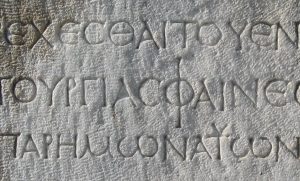Instructor 
- Andrew Wolpert, Ph.D., Director of UF Quest and Associate Professor of Classics
- Email: wolpert@ufl.edu
- Office Phone: 352-273-3702
- Office Hours: Monday, Wednesday, and Friday Period 3 and at other times by appointment.
- How to meet me: You do not need an appointment to meet with me during my Office Hours. If you call or email me, I will send you a Zoom link. To schedule an appointment for a different time, please email me.
Course Format
- Meetings: Monday, Wednesday, and Friday Period 2. Click on Zoom Conferences on the course’s Canvas page for the Zoom link to class meetings.
- Online Drills: On Thursday, students complete an online drill in Canvas that is intended to help them review morphology and vocabulary.
Class Description and Objectives
GRE 1121 is the second half of the beginning ancient Greek sequence. Students will learn the basic vocabulary, morphology, grammar, and syntax of ancient Greek, and they will read adapted passages from ancient Greek authors. Upon completion of GRE 1121, students will be able to identify, explain, and analyze the basic elements of ancient Greek and read ancient Greek authors at the intermediate level.
Required Texts
- Cynthia W. Shelmerdine, Introduction to Greek, 2nd Edition (Newbury, MA: Focus Publishing, 2008). ISBN: 1585101842. Students are required to purchase the second edition.
Course Requirements
- Attendance (20%). Attendance will be taken at class meetings. There will be a 50% deduction for arriving late, leaving early, or being unprepared for class.
- Daily Homework (20%). Please consult the course’s Canvas page for the daily homework assignments. Students will be granted an extension on the daily homework only in the case of an excused absence (see UF Attendance Policies).
- Weekly Online Drills (20%), the lowest score is dropped.
- Tests (30%): Test 1 (100 points) on October 2, Test 2 (100 points) on November 5, and Test 3 (100 points) on December 9.
- Ancient Greek Unlocked (10%). In consultation with Dr. Wolpert, students will create a project that provides them the opportunity to explore in depth an aspect of the ancient Greek language, and they will present their project to the class. Students will choose one of the following dates to complete the assignment and present their project: Nov. 9, Nov.13, Nov.16, Nov. 20, Dec. 4, or Dec. 6.
Weekly Schedule*
- Aug 31-Sept 4: Review and Chapter 19
- Sept 7-11-: Chapters 19 and 20
- Sept 14-18: Chapters 20 and 21
- Sept 21-25: Chapters 21 and 22
- Sept 28-Oct 2: Chapter 22 and Test 1
- Oct 5-9: Chapters 23 and 24
- Oct 12-16: Chapters 24 and 25
- Oct 19-23: Chapter 26 and Chapter 27
- Oct 26-30: Chapters 27 and 28
- Nov 2-6: Chapter 28, Test 2, and Chapter 29
- Nov 9-13: Chapters 29 and 30
- Nov 16-20: Chapters 30 and Chapter 31
- Nov 23-24: Chapter 31
- Nov 20-Dec 4: Chapters 32 and 33
- Dec 7-9: Chapter 34 and Test 3
*For the daily assignments, please consult the course’s Canvas page.
Grading Scale*
A = 93–100%
A- = 90–92%
B+ = 87–89%
B = 83–86%
B- = 80–82%
C+ = 77–79%
C = 73–76%
C- = 70–72%
D+ = 67–69%
D = 63–65%
D- = 60–62%
E < 59%
*Grades are rounded to the nearest whole number (e.g., 89.4% = 89% and 89.5% = 90%)
Course Policies
- Academic Honesty: UF students are bound by The Honor Pledge which states, “We, the members of the University of Florida community, pledge to hold ourselves and our peers to the highest standards of honor and integrity by abiding by the Honor Code. On all work submitted for credit by students at the University of Florida, the following pledge is either required or implied: ‘On my honor, I have neither given nor received unauthorized aid in doing this assignment’.” The Honor Code specifies a number of behaviors that are in violation of this code and the possible sanctions. Furthermore, you are obligated to report any condition that facilitates academic misconduct to appropriate personnel. If you have any questions or concerns, please consult with the instructor of this class.
- Course Accessibility: Students with disabilities who experience learning barriers and would like to request academic accommodations should connect with the Disability Resource Center by visiting https://disability.ufl.edu/students/get-started/. It is important for students to share their accommodation letter with their instructor and discuss their access needs, as early as possible in the semester.
- Attendance and Make-up Policy: Requirements for class attendance and make-up exams, assignments, and other work in this course are consistent with university policies: https://catalog.ufl.edu/ugrad/current/regulations/info/attendance.aspx
- Course Evaluation: Students are expected to provide professional and respectful feedback on the quality of instruction in this course by completing course evaluations online via GatorEvals. Guidance on how to give feedback in a professional and respectful manner is available at https://gatorevals.aa.ufl.edu/students/. Students will be notified when the evaluation period opens, and can complete evaluations through the email they receive from GatorEvals, in their Canvas course menu under GatorEvals, or via https://ufl.bluera.com/ufl/. Summaries of course evaluation results are available to students at https://gatorevals.aa.ufl.edu/public-results/.
Counseling Resources
Students experiencing either health or personal problems that interfere with their general well-being are encouraged to seek assistance through the university’s health care and counseling centers. Resources are also available on campus for students who wish to explore their career options.
- Student Health Care Center, 392-1161, http://shcc.ufl.edu/
- University Counseling and Wellness Center, 3190 Radio Road, 392-1575, https://counseling.ufl.edu/
- UMatter We Care, 294-care, umatter.ufl.edu
- Career Connections Center, Suite 1300, J. Wayne Reitz Union, 392-1602, www.crc.ufl.edu/